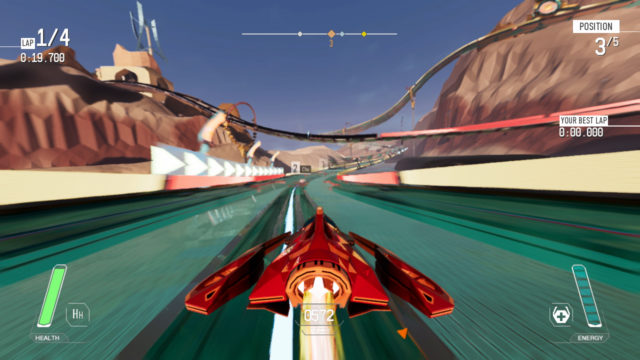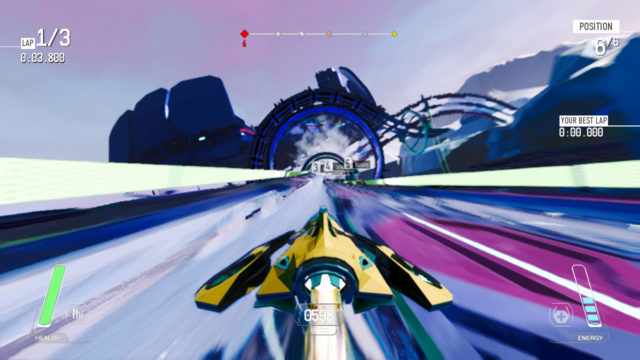Great colorful visuals; rewarding progression system; a solid challenge for some
Annoyingly challenging for others due to poor difficulty curve and lack of training; bland menus
Seeing as we live in a world in which Nintendo apparently has little interest in delivering a sequel to its cult classic racing franchise F-Zero, gamers must make do with the efforts of independent teams inspired by the classic title. This fate isn’t too bad, though, as some of these games have ranged from decent enough to legitimately great; see Shin’en’s Fast RMX for the latter. Now another developer, 34BigThings, is taking a crack at bringing some high-speed hover car racing to Switch, so we’ll have to see how it handles the competition.
The concept is simple: hop in a futuristic, gratify defying racing vehicle and race through outlandish tracks at ridiculous speeds. Many games have attempted this idea before, and in all of them, the presentation has proven surprisingly significant, as F-Zero always set a high bar for selling the sense of speed and future sport aesthetic. Redout largely succeeds in this regard thanks to some smart design decisions. A concentrated examination of the game reveals a low polygon style that undoubtedly is key to the game running as fast as it does, especially on Switch’s comparatively weaker hardware. While this might make things look worse in a slower game, the sheer speed renders it irrelevant as the world zips by at a rate that makes closer examination entirely pointless. The game’s great lighting helps as well, both making the worlds feel more realistic, as well as giving the vehicles and tracks a nice, futuristic sheen.
The slick look of the races is strangely contrasted against the surprisingly boring and basic menus. The general design and fonts have a high-tech look, but the actual layout and structure is very simple and uninspired. Yes, it’s perfectly functional, but the fact that they are completely devoid of anything even remotely flashy serves only to dampen the sense of excitement these sorts of games should be trying their hardest to maintain.

Thankfully the soundtrack is better at keeping your pulse pounding with its thumping techno beats. Then again, that’s more or less what’s expected from this sort of game, so while it doesn’t try to push any boundaries, it at least delivers a satisfying norm. The same can be said for the overall audio design as the effects for boosting and crashing are all perfectly serviceable.
Where Redout attempts to set itself apart is where it most matters- the gameplay. The basic controls will be familiar for any racing game fan, but compared to many of its peers, Redout puts a much bigger emphasis on its drifting mechanics. The best, fastest lines through the corners require initiating a drift counter to your steering input before bringing your vehicle back in line as you exit the corner. In other words, doing well really requires a lot of skill and practice. Unfortunately, the game really makes no effort to explain this or gradually build up the difficulty as mastery of this skill is required even early on just to hold your own. If anything, the difficulty curve goes the wrong way as progressing through the game gives you the means to unlock upgrades and better vehicles that allow for superior handling stats. Some might enjoy this immediately demanding approach to challenge, but many others will likely find it quite frustrating. I certainly did; in fact, I don’t know if I ever really became completely comfortable with the controls.
As mentioned above, the game includes a progression system and that is another area where it breaks from some of its genre kin. Races give you both experience and money. The former increases your level which allows you to buy higher tier vehicles while the latter can be used for buying and upgrading power-ups, which come in two varieties. Active power-ups draw energy from the pool that is also used for boosting and serves a variety of purposes, from repairing the damage taken in collisions to draining the energy from other racers. Passive power-ups simply boost different statistics, like speed or cornering. A larger variety of offensive abilities would have been interesting, but overall this system encourages customization as well as replayability as you try to acquire and max out everything.

Replaying career events or just delving into Quick Race is made more enjoyable thanks to the variety of events available. All of the racing variants are familiar, such as standard time attacks and an elimination mode, but their presence is most certainly appreciated. For people who like a simpler experience, there are even “pure” events which turn off all power-ups, thus forcing everyone involved to prove their true skill with the basic mechanics. Of course, online multiplayer is included but it’s limited only to variations on normal races.
Redout deserves credit for trying to evolve the core gameplay behind the F-Zero franchise and the many other games it inspired, however the execution is somewhat disappointing. The higher skill level demanded even at the beginning can be quite frustrating as there seems to be little build up to it or efforts to explain the finer mechanics required to succeed. This is made even more disappointing by the fact that the rewarding progression system would otherwise serve as inspiration to put many more hours into the game. The presentation also comes across as a mixed bag due to the great looking races being let down by bland menus. All told, Redout is likely a great option for those who are looking to master intentionally difficult gameplay mechanics, but most everything else about it will come across as generally middling or even frustrating to most.
Nintendojo was provided a copy of this game for review by a third party, though that does not affect our recommendation. For every review, Nintendojo uses a standard criteria.




 ShareThis
ShareThis





